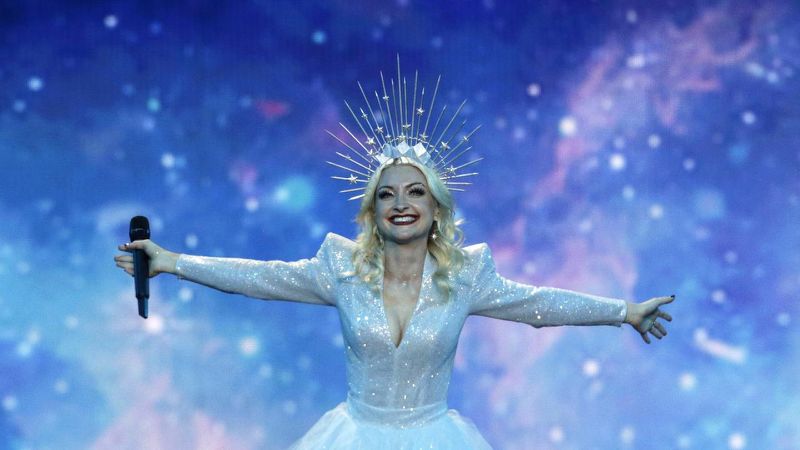Australia/Israel Review
Media Microscope: Lights, Camera, Boycotts
May 31, 2019 | Allon Lee

It was inevitable that Israel’s hosting of Eurovision 2019 would become another opportunity for the Boycott, Divestment and Sanctions (BDS) movement to advance its destructive cause.
BDS was a footnote in most local stories about Australian Eurovision entrant Kate Miller-Heidke, but not for the ABC, which felt it necessary to repeatedly report and amplify the BDS campaign.
ABC Radio National “Breakfast” interviewed academic and Eurovision uberfan Anika Gauja on May 3 and May 20 – but she largely dismissed BDS-related issues
ABC TV “The World” (May 14) interviewed Eurovision historian Dean Vuletic who said “the most politically controversial Eurovision so far was the one in Azerbaijan in 2012,” and that BDS has had “no effect… on the contest.”
ABC resources were allocated to an online report (May 16) publicising an anti-Israel stunt called “Gazavision” held among the rubble of a building in Gaza. The next day another original ABC online report said “Israel’s participation… is always [contentious]… mostly due to the nation’s treatment of the country’s Arab population.”
On ABC Radio National “Correspondents Report” (May 12), Middle East correspondent Eric Tlozek filed a story called “Eurovision’s Israel Problem” – which could have been titled “Eric Tlozek’s Israel Problem.”
Tlozek repeatedly told listeners the BDS movement’s justifications for boycotting Israel, but didn’t mention even one reason why 100 artists, writers and musicians signed a counter-boycott statement.
On the potential threat of a terror attack during the competition, Tlozek seemed to imply that Israel is the initiator of violence, saying Palestinian militant groups had “released a video online threatening to target the Eurovision venue if Israel doesn’t honour a recent agreement to keep things quiet.”
Having reported for ABC TV “7pm News” (May 5) that “the violence flared on Friday when two Israeli soldiers were shot on the Gaza border. Israel killed two Hamas militants in an airstrike in response, triggering the rocket barrage,” Tlozek should know “quiet” depends largely on choices made in Gaza, not in Israel.
Addressing why tourist numbers were lower than expected, Tlozek revealed his true feelings about Israelis, saying, “It’s a very expensive country and its reputation for hospitality is poor… Israelis are proud of being blunt but they might not realise many people simply think they’re rude or… and I suspect this is more likely, they don’t care.”
A 2018 survey from InterNations, the largest global network and information site for expats living and working abroad, ranked Israel 24th friendliest country out of 65 countries listed – seven spots above New Zealand, 13 spots in front of Australia and a whopping 32 ahead of Britain.
Unlike Tlozek, Age and Sydney Morning Herald reporter Michael Idato (May 16) included a quote from the anti-BDS statement and in a May 18 piece, quoted Miller-Heidke saying, “‘I don’t believe that as an artist playing in a country means that you support that country’s government. If that were the case, who would ever play in America right now?’”
Even the Guardian Australia (May 1) ran a long article on the anti-boycott statement. But on May 9, Guardian columnist Arwa Mahdawi attacked Israel’s hosting of Eurovision, decrying Israeli security measures, excusing self-destructive decisions made by Palestinian leaders and whitewashing BDS as a peaceful protest movement, without mentioning its ultimate goal is to replace Israel with an Arab majority state.
The Australian’s Rachel Baxendale reported (May 13 and May 18) on Greens’ candidates backing boycotting Israel’s hosting of Eurovision, even to the extent of shaming Greens Senator Larissa Waters for “endorsing Eurovision held in apartheid Israel.”
AIJAC’s Ahron Shapiro also noted the number of Australian Greens politicians and candidates backing BDS in contravention of the party’s official platform, including former NSW Greens Senator Lee Rhiannon who cross-examined then SBS Chairman Michael Ebeid in 2018 on why the network was broadcasting the show, absurdly suggesting “it could actually impact on who lives and who dies,’” Australian (May 16).
With a few exceptions, the bulk of SBS’s coverage was competition-focused. SBS TV “World News” (April 27) reported a small protest outside its Sydney office but included a statement that “SBS has been proudly broadcasting Eurovision for 35 years and we will continue to do so in 2019, because of the spirit of the event in bringing people and cultures together.”
Tags: Anti-Zionism, Australia, Media/ Academia






